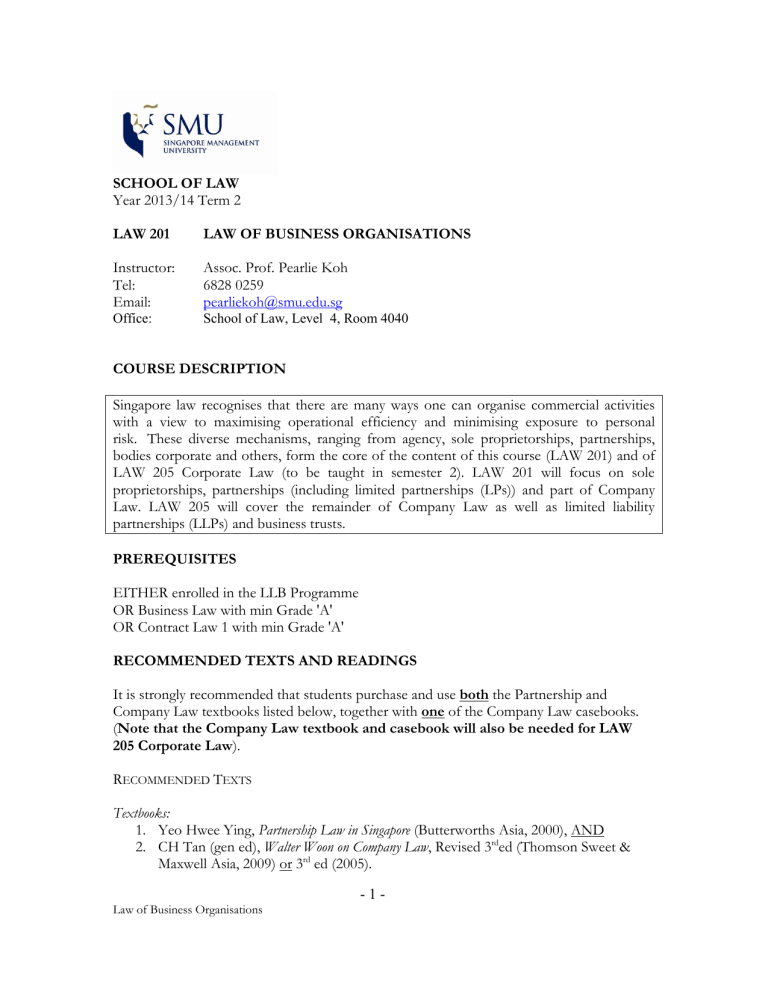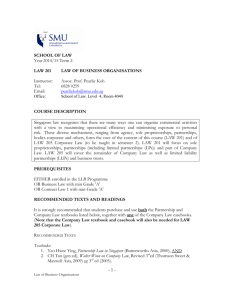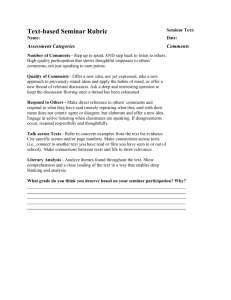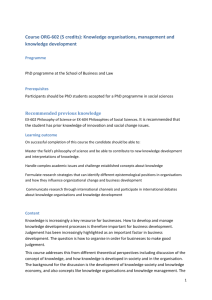- 1 - SCHOOL OF LAW Year 2013/14 Term 2 LAW 201 LAW OF

SCHOOL OF LAW
Year 2013/14 Term 2
LAW 201 LAW OF BUSINESS ORGANISATIONS
Instructor: Assoc. Prof. Pearlie Koh
Tel:
Email:
6828 0259 pearliekoh@smu.edu.sg
Office: School of Law, Level 4, Room 4040
COURSE DESCRIPTION
Singapore law recognises that there are many ways one can organise commercial activities with a view to maximising operational efficiency and minimising exposure to personal risk. These diverse mechanisms, ranging from agency, sole proprietorships, partnerships, bodies corporate and others, form the core of the content of this course (LAW 201) and of
LAW 205 Corporate Law (to be taught in semester 2). LAW 201 will focus on sole proprietorships, partnerships (including limited partnerships (LPs)) and part of Company
Law. LAW 205 will cover the remainder of Company Law as well as limited liability partnerships (LLPs) and business trusts.
PREREQUISITES
EITHER enrolled in the LLB Programme
OR Business Law with min Grade 'A'
OR Contract Law 1 with min Grade 'A'
RECOMMENDED TEXTS AND READINGS
It is strongly recommended that students purchase and use both the Partnership and
Company Law textbooks listed below, together with one of the Company Law casebooks.
( Note that the Company Law textbook and casebook will also be needed for LAW
205 Corporate Law ).
R
ECOMMENDED
T
EXTS
Textbooks:
1.
Yeo Hwee Ying, Partnership Law in Singapore (Butterworths Asia, 2000), AND
2.
CH Tan (gen ed), Walter Woon on Company Law
Maxwell Asia, 2009) or 3 rd ed (2005).
, Revised 3 rd ed (Thomson Sweet &
Law of Business Organisations
- 1 -
Casebooks:
1.
LS Sealy and S Worthington, Cases and Materials in Company Law , 10 th ed (Oxford
University Press, 2013). The older editions, including the 7 th edition (by LS Sealy alone) are adequate alternatives; OR
2.
Andrew Hicks & SH Goo, Cases and Materials on Company Law, 7
University Press, 2011).
Earlier editions are adequate alternatives. th ed (Oxford
S INGAPORE L EGISLATION AND C ASE L AW
Students will also need to download pertinent Singapore legislation and case law from online databases such as LawNet ( www.lawnet.com.sg
)
as the course progresses. The main pieces of legislation that we will be referring to are:
Business Registration Act 32
Partnership Act Cap 391
Companies Act Cap 50
S UPPLEMENTARY R EFERENCE T EXTS
Students may sometimes find it helpful to look at particular issues in more detail. The following is a non-exhaustive list of well-known texts on areas relevant to the course. It is not necessary to buy any of these texts which are available in the Library.
1.
Geoffrey Morse,
9 th
Partnership Law , 7 th ed, (Oxford University Press, 2010)
2.
Paul L Davies & Sarah Worthington, Gower & Davies’ Principles of Modern Company Law , ed (Sweet & Maxwell, 2012);
3.
Brenda Hannigan, Company Law , 3 rd ed (Oxford University Press, 2012)
4.
Mayson, French and Ryan, Company Law , 28 th ed (Oxford University Press, 2011)
The law of agency in Singapore is the subject of chapters by: a.
Pearlie Koh, in Loo and Shenoy (gen eds), Principles of Singapore Business Law, 2 nd ed (Cengage Learning, 2013); and b.
Tan Yock Lin, in M. Hwang (gen ed), Law Relating to Specific Contracts in Singapore
(Thomson Sweet & Maxwell, 2008).
COURSE METHODS
The course will be conducted in seminar sessions of 3 hours each per week. There will be a short break after the first hour and a half, or as necessary.
Law of Business Organisations
- 2 -
ASSESSMENT METHOD
Class Participation -
Group Assignment -
Midterm Test -
Final Examination -
- TOTAL
Class Participation
15%
20% (i.e., 15% for the written assignment (combined grade) and 5% for individual oral presentation)
25%
40%
100%
You will be assessed on your participation in class throughout the course.
Participation may take the form of both questions and comments. However, class participation will be assessed on the quality of contributions and how they add constructively to seminar discussions. To contribute effectively, therefore, you should complete the relevant assigned reading as well as exercises prior to attending the seminar. Quite apart from the grades allotted, active participation by students will create a vibrant and interactive environment conducive to learning. Class participation comprises 15% of the final grade.
Group Assignment
Students will be grouped into teams of 4 - 6 persons each. Assignments typically take the form of hypothetical problems. The assignment will require students to study and present, in written memorandum form, the group’s analysis of and views on the legal issues arising from the hypothetical situation. Students are also required to make an oral presentation in class of their analysis and views on such a problem. The assignments will be graded in the proportion of 15% for written assignment (common grade unless there is substantial disparity in individual contribution to group work) and 5% for oral presentation (based on the individual’s performance). The ability of the group to generate class discussion will be recognised in the assessment mark.
Students will in general be able to form their own groups voluntarily if they so wish.
However, the instructor retains the discretion to re-allocate students where necessarily to keep group numbers as even as possible. Generally, topics are given out about 1.5 weeks before the due date.
Mid-term Test
A mid-term test will be held around the time of the mid-term recess. It is likely to be a 1.5hour open-book test consisting of one or two questions in the form of hypothetical problems (or, more rarely, essay questions). The mid-term test mark will comprise 25% of the final grade. More details will be given closer to the time
Law of Business Organisations
- 3 -
Final Examination
The final examination will be a 3-hour open-book paper comprising problem and/or essay questions. The final examination will comprise 40% of the final grade.
IMPORTANT: Academic Integrity
All acts of academic dishonesty (including, but not limited to, plagiarism, cheating, fabrication, facilitation of acts of academic dishonesty by others, unauthorized possession of exam questions, or tampering with the academic work of other students) are serious offences.
All work presented in class must be the student’s own work. Any student caught violating this policy may result in the student receiving zero marks for the component assessment or a fail grade for the course. This policy applies to all works (whether oral or written) submitted for purposes of assessment.
When in doubt, students are encouraged to consult the instructors of the course. Details on the SMU Code of Academic Integrity may be acces sed at http://www.smuscd.org/resources.html
.
CLASS SCHEDULE
Week Seminar
1 1
2 2
Topic
I NTRODUCTION
1.1
Forms of business organisation
1.2
Sole proprietorships
1.3
Business Registration Act
1.4
Essentials of partnership
A
GENCY AND
P
ARTNERSHIP
2.1
Agency overview
2.2
Actual authority
2.3
Ostensible authority
2.4
Principal, agent and third party relationships
2.5
Relationship of partnership to outsiders
3
4
3
4
P ARTNERSHIP L AW
3.1
Relationship among partners
3.2
Partnership property
P
ARTNERSHIP
L
AW
4.1
Dissolution
4.2
Limited Partnerships
Law of Business Organisations
- 4 -
Week Seminar
5 5
6
7
8
9/10
11
6
7
-
8/9
10
Topic
I NTRODUCTION TO C OMPANY L AW
5.1 Introducing the company
definition
context
legal personality
exceptions
5.2 Types of companies
5.3 Corporate groups
5.4 Company promotion
C ONSTITUTION
6.1 Memorandum of association
6.2
Articles of association
Scope & effect
6.3
Alteration of constitution
6.4
Shareholders’ agreements
6.5
Reform of the law
O
WNERSHIP
7.1 Shareholding
7.2 Share capital
Classes of shares
Class rights
7.3 Membership
7.4 Incidents
MID-TERM RECESS WEEK
M ANAGING THE C OMPANY
8.1
How a company operates
8.2
The General Meeting
8.3
The Board of Directors
8.4
Decision-making process
General meeting
Board of directors
D IRECTORS ’ D UTIES (1)
9.1
Issues of scope
Different stakeholders
Law of Business Organisations
- 5 -
Week Seminar Topic
To whom are duties owed?
9.2
General equitable duties
Bona fide rule
Proper purpose rule
12 11
9.3
Fiduciary duties
No-conflict rule
No-profit rule
D IRECTORS ’ D UTIES (2)
10.1
Duty of care, skill and diligence
10.2
Consequences of breach
Civil liability of directors and third parties
Criminal liability
Ratification
10.3
Reform of the law
C
OMPANY
C
ONTRACTS
13 12
14
15
-
-
11.1
Pre-incorporation contracts
11.2
Corporate capacity
Ultra vires
Recent reform
11.3
Company organs and agents
Agency principles (recap)
Doctrine of constructive notice
Indoor Management rule
REVISION WEEK ( NO SEMINAR )
FINAL EXAMINATION
The above schedule is subject to change.
Law of Business Organisations
- 6 -






